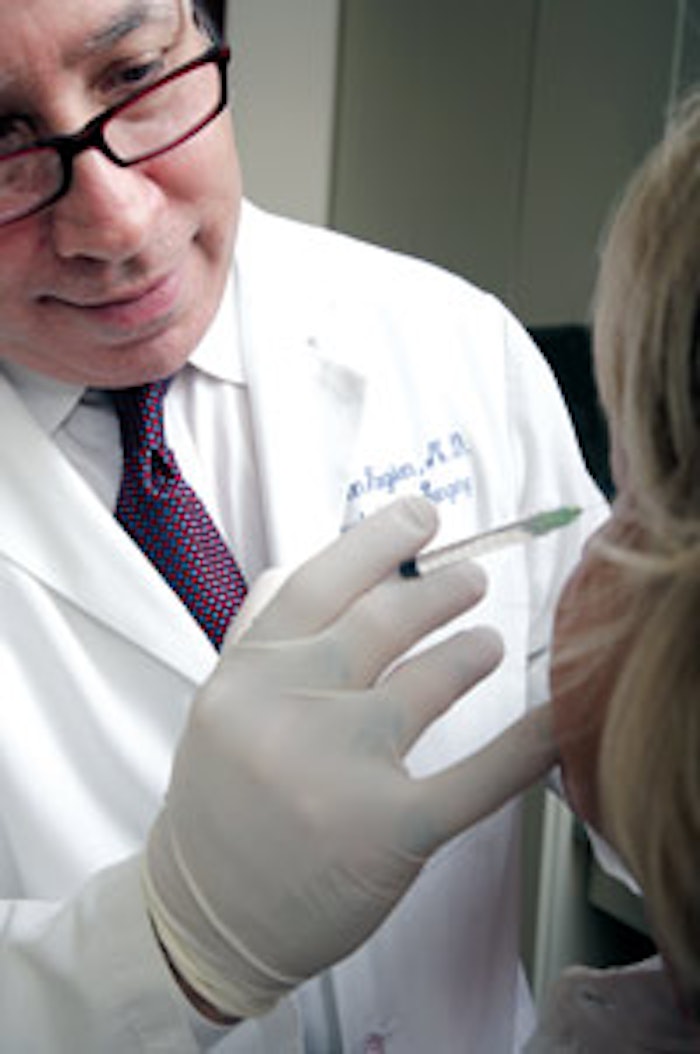
No matter where you look in the office of Steven Fagien, MD, FACS, you see small touches of the physician at the center of this practice. Whether it is in the main entryway where he created a compass-shaped design in the tile floor and a painted sky visage on the domed ceiling, or the commissioned pencil drawings of famous sets of eyes that adorn the walls of the reception area, or the book, authored by Fagien, with the colorful Andy Warhol-like cover featuring various plays on the same ideal eye, he permeates the space he uses to greet the most important assets of his practice—his patients. Even the jazz piped into the reception area has been chosen because, beyond his practice, the physician has an incredible passion for that music genre.
In all of these details, it is apparent that Fagien is a physician who knows what he likes and what he wants, and he has been managing his career and his business with this mentality since the beginning.
Choosing ophthalmology
As identical twins, Fagien and his brother Michael were both in high school when they decided on what field they would enter. “My brother and I were fairly bright and, as twins, we would discuss our futures and simply asked, ‘What are we going to be when we grow up?’ Many of the people that I looked up to and respected in our town were physicians, and for me, it was a choice of having a respectable job in something that frankly not everybody can do,” explains Fagien.
Both he and his brother, who is now a radiologist, decided being doctors seemed like a great career choice, and both have found success in the field. Fagien believes his personality is one that is tailored to being a physician. “I like people; I’m people-oriented. It’s kind of how I entered into what I finally decided to do with my career,” he says, referring to his eventual decision to become an ophthalmologist and aesthetic cosmetic surgeon.
The decision wasn’t immediate, however. In fact, when Fagien initially began studying medicine at the University of Florida in Gainesville, Florida, he had every intention of working in hematology or oncology.
“Those fields really offered something that could help people, and I always wanted to do great things and help those in severe need,” he explains. However, during his studies, Fagien found that even though he was working to accomplish good things, it didn’t always feel good, due to the obvious nature of the diseases on which he was focusing. “I asked myself what I wanted to be doing 20 years into my practice—knowing that I was going to have a family and so forth—so I made a quick decision that I probably wouldn’t pursue hematology or oncology as a profession,” he explains.
At the time, ophthalmology as a specialty piqued his interest because it offered the ability for Fagien to be both a surgeon and a medical doctor. Although he considered specializing in plastic surgery, he wasn’t initially committed to it as a field. “Ophthalmology gave me the luxury of doing several things, and then I could pick and choose and subspecialize. In the middle of training, I realized I really didn’t want to be an eye surgeon. I couldn’t see doing cataract surgery for the rest of my life,” says Fagien.
At this time one of his mentors, Melvin Rubin, MD, suggested oculoplastics as a career. It was late in the year when Fagien decided to pursue oculoplastics, and many schools had already decided on fellows, but when doing his research about which universities offered the best programs, Fagien found the University of Illinois Eye and Ear Infirmary in Chicago was a leader. A last-minute trip to the Windy City in order to grab the attention of Allen Putterman, MD, paid off, with Putterman giving Fagien the nod to start his experience in Chicago. After a rigorous fellowship where Fagien was the only oculoplastics fellow in the city, he was recruited by a group of physicians in Florida and decided to return to a warmer climate, with his degree in hand.
During his first years in the field, Fagien worked to figure out what he really wanted to focus on in oculoplastics. “I started doing a lot of reconstructive surgery, trauma and cancer cases, and enjoyed it. When I entered private practice and moved to Boca Raton, people were coming to me saying they were interested in having their eyes done by a guy who was trained in ophthalmology. It’s a fairly affluent population and many are of an age where they are interested in having cosmetic surgery,” says Fagien. “And the more I did cosmetic surgery, the more I loved it. I got that feeling that ... I wasn’t saving the world ... but I was helping patients who weren’t happy with their appearances leave my office thinking they looked pretty darned good.”
Soon, Fagien found himself receiving invitations to speak at national meetings, and plastic surgeons who had seen his work were inviting him to speak at events. He developed several procedures in cosmetic oculoplastic surgery that have become standard, and now specializes only in cosmetic eyelid surgery and injectables.
But staying within the confines of his specialty is not the key to growth, according to Fagien. “Many people just stick to their specialty and only hang with those in their specialty and consider others the enemy. I don’t subscribe to that at all. I like to collaborate with those who are credible contributors, whether they are dermatologists or plastic surgeons, who have offered a lot to aesthetic medicine,” he says. “Everyone sees things differently, and you can learn a lot from someone else’s vantage point.”
Ethics and the economy
One of the most important motivators for Fagien is to make sure he earns his success in what he believes to be an ethical and straightforward manner, avoiding some of the trappings he sees as potentially misleading to patients. “Most of the patients that see me have done a lot of homework, and they haven’t done homework by visiting my Web site,” says Fagien, who proudly conducts business without one. “I’m not against the Web, and I think there are people who have Web pages that are spectacular for information, but they can also be deceptive. I’ve known on many occasions those who have questionable or marginal talent with Web sites that are incredible, and you would think they’ve invented every procedure known to plastic surgery. It’s buyer beware.”
Instead, Fagien relies on word-of-mouth referrals as his most trusted source of business. “When somebody has heard about your reputation, those are the kind of patients who are serious about surgery and are not just shopping,” he explains, noting that he counts his ability to nurture real relationships with his patients as one of the biggest secrets of his success.
“I find that patients in many ways become long-term, friendly relationships, and we set up our offices to be a friendly environment. My patients love my office staff; my staff treats them with respect. My patients get what they came for and are extremely satisfied with their results. There’s no referral stronger than excellent results, and there’s nothing as long-lasting,” he says.
In fact, Fagien’s patients recently were the ones who reaped the benefits of the slow economy. “Anyone who says the economy didn’t affect them was not being truthful; it affected all of us,” Fagien says. “For patients, it was an advantage because they could get in earlier. We were still full, but we weren’t crazy. The benefit of having a busy practice was that I had a significant backlog in surgery scheduled far enough in advance that it kind of made up for some of the losses.”
The practice is now experiencing a slight upturn because people are beginning to schedule surgery again. But in the bleakest moments of the economy, Fagien’s practice experienced a drop in surgery and, surprisingly, an increase in injectables. “I don’t think the economy is getting any better. I think people are getting used to it and tightening their belts,” says Fagien.
Another facet of his successful practice is his substantial research involvement. Fagien insists that he does research because he is truly interested in innovations and being involved with progress. “We have a truly exceptional clinical study department. We do a thorough and efficient job here, too,” he says.
Avoiding the spotlight
Plastic surgery is a field that has become a curiosity to many in the general public, fueling much media coverage and the ascension of some doctors into more public roles, whether as news correspondents or reality show stars. This path, however, is not one that interests Fagien in the slightest.
“I take my work very seriously. I’m not suggesting that I don’t have maybe a larger ego than some, but I don’t have that need to be in the media that some people do. There’s a certain level of ethics that I feel I maintain by purposely not being interested in it,” he says. “I find some of the serious patients are actually less interested in surgeons who are so visible in the media.”
In fact, what remains a public fascination Fagien sees as a very private issue: treating many well-known people at his office who demand confidentiality. “Media is a double-edged sword. It raises the interest in plastic surgery, but it presents some risks, too. The risk of making plastic surgery so public is that it demeans the importance of selecting a very qualified surgeon to do a procedure, and it suggests that there are no risks to procedures, which I find can be dangerous when someone hears something that suggests it sounds easy,” emphasizes Fagien.
Personal balance
Although he spends plenty of time with his patients, Fagien also finds the time to write, a talent of his he’s practiced, becoming a published author on the topics of plastic surgery—and jazz. Fagien’s twin brother began JAZZIZ magazine during their college years, and it is now one of the top jazz publications in the world. “I wrote for the magazine for awhile,” says Fagien. “I wasn’t good at it, though. I can write, but it is much easier for me to write about plastic surgery.” And he does; Fagien has authored more than 300 articles in his field. “Being in private practice somewhat removes you from academia, and writing helps me stay involved,” he says. Fagien also is the author of the book Putterman’s Cosmetic Oculoplastic Surgery (Elsevier, 2008), an honor that was bestowed on him by his former professor and mentor, Putterman.
Writing isn’t his only passion, or even his primary one, however—that honor belongs to his wife and three daughters. Although he admits maintaining balance can be a challenge due to professional obligations, he is grateful to have enjoyed a calmer period of time when his children were younger.
“Fortunately, the times when I was growing my practice and I was less busy, my kids needed me the most and I was around much more. When they got to be teenagers and didn’t really care if I was around as much was about the time I started traveling quite a bit,” he says. One appointment that still rarely gets canceled though is Fagien’s nightly dinner at home with his family. “That’s a really special time. We’ve done it for 20 years, and that we never compromised.”
Fagien’s secret to maintaining personal and professional balance? “You pick and choose. You prioritize and figure out what’s important,” he says, and one of the things that helps Fagien keep this balance is making ample time to get away with his family. “I like going away and sometimes doing absolutely nothing,” he shares, saying he does see a time when he will be ready to hang up the day-to-day responsibilities of his practice—but not for quite awhile.
“I think sometimes surgeons need to retire,” he laughs. “I think you have to realize when it’s time to call it quits. I am very hopeful that I am as good at 70 as I am in my 50s, but I’m not sure I will be. I have a lot of colleagues that I respect, and we’ve promised each other that we would tell each other when that day comes.”
A feeling of accomplishment
With retirement in the distant future, Fagien is enjoying his place in aesthetic medicine and plans on continuing to write and innovate on his own terms. “I’ve enjoyed maintaining the reputation of a high-integrity practice; one in which my colleagues, the industry and surgeons outside of the country are interested in what I have to say and get me involved because they know I will do the right thing,” says Fagien. “I like being known for being one of the best at what I do. I try to maintain that level because I feel good about it. I can go home and go to sleep and be proud of what I have done because I did it by working hard at it. I feel that way every night.”










